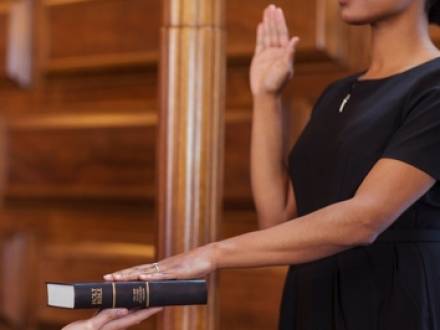What Happens If Your Spouse Lies in Court?
 Few things are more frustrating than standing in a courtroom and listening to your spouse lie under oath. Whether the falsehood concerns parenting, finances, or accusations of abuse, the immediate instinct is to ask, "Can anything be done?" The answer is yes, but the process is not simple, and the remedies depend on the context of the lie, how it is uncovered, and what the court believes the truth to be.
Few things are more frustrating than standing in a courtroom and listening to your spouse lie under oath. Whether the falsehood concerns parenting, finances, or accusations of abuse, the immediate instinct is to ask, "Can anything be done?" The answer is yes, but the process is not simple, and the remedies depend on the context of the lie, how it is uncovered, and what the court believes the truth to be.
In divorce cases, the stakes are high. False statements can distort custody arrangements, financial support orders, and a party’s overall credibility. For this reason, Maryland courts take deliberate measures to detect deception, evaluate credibility, and impose consequences when necessary. Having an outstanding Glen Burnie, MD divorce attorney who understands how Maryland courts handle cases like this can significantly impact the outcome of your divorce.
Lying Under Oath in Maryland Divorce Cases
Lying in court, known legally as perjury, is a criminal offense in Maryland. However, family law judges do not usually criminally charge people for this behavior. Instead, they focus on the immediate issue before them: Determining what is true, what is false, and how any falsehoods affect the outcome of the case.
For most family law issues, the court must do its best to determine the truthfulness of statements made in affidavits, financial disclosures, and live testimony. When one spouse lies, whether about income, parenting time, or abuse allegations, the court may need to do something, but it often falls to the other spouse’s attorney to bring the truth to light.
One of the most common forms of misrepresentation occurs in financial affidavits. A spouse may underreport income, inflate expenses, or conceal assets in an effort to manipulate child support, alimony, or property division. When this happens, discovery becomes essential.
Attorneys use subpoenas, document requests, and depositions to gather evidence. Pay stubs, tax returns, bank statements, and business records can reveal the truth. When a lie is proven, the court may order recalculation of support, assign a greater share of marital assets to the innocent party, or impose sanctions against the dishonest spouse.
False Allegations in Custody Disputes
Accusations of abuse, neglect, or parental unfitness can dramatically shape a custody case. Unfortunately, some parties misuse these allegations to gain leverage. Maryland courts are aware of this possibility and require evidence beyond a parent’s word. Judges may appoint custody evaluators, interview children privately, or consider input from school officials and medical professionals.
If a judge concludes that someone knowingly made false accusations, the consequences can be severe. The court may alter custody arrangements to protect the child from manipulation, limit the accusing party’s parenting time, or require supervised visitation.
Distinguishing Mistakes from Lies in Court
Not every incorrect statement is perjury. People forget dates, miscalculate expenses, or misstate timelines all the time, and the court knows this, so it distinguishes between honest mistakes and deliberate falsehoods. Pattern, motive, and the opportunity to fix a mistake all play a role.
That is why it is important to work with attorneys who know how to examine inconsistencies, follow the paper trail, and expose not only what was said but what was intentionally left out. A single discrepancy may be explainable. A web of lies is not.
Work With a Talbot, MD Divorce Lawyer Who Knows How to Uncover the Truth
If your spouse has lied in family court, you need more than sympathy. You need action. Zide Law Group, LLC combines litigation strength with focused, personal attention. We help clients navigate false allegations, expose lies, and present clear, compelling evidence in court. Call our Glen Burnie, MD family law attorney at 410-760-9433 to schedule a consultation and protect your future.





